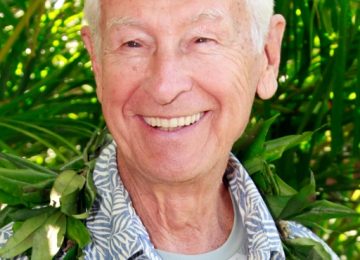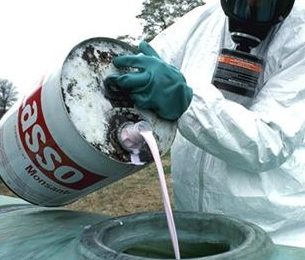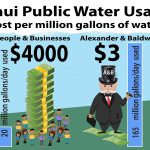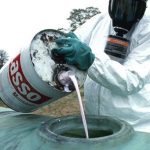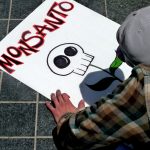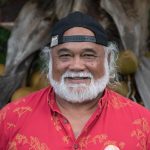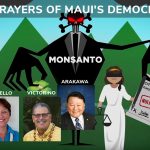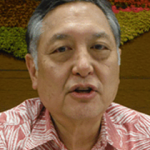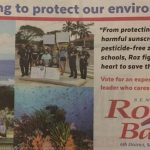The state is finally taking some first steps to address concerns about pesticide drift from large agri-chemical company operations in Hawaii. In a joint press statement, the Hawaii Departments of Health and Agriculture described several initiatives recommended by the state/county sponsored Joint Fact Finding Group Report.
Plans include a $500,000 surface water quality study (by the U.S. Geological Survey) for Oahu and Kauai to evaluate whether pesticides are moving offsite at unacceptable levels. A statewide pesticide use disclosure program (but only voluntary and partial). A statewide buffer zone policy (details yet to be outlined).
DOH will require pesticide usage to be reported every month, and that information will be made public on state websites. The DOA pesticide advisory committee is being expanded and the charge to register pesticides will be tripled. That will give us additional revenue streams that we’ll get for the monitoring.
The JFF report highlighted the DOA’s backlog of 780 cases and the department has now hired a deputy attorney general to solely focus on pesticide issues.
Civil Beat reported on Dec. 15th the U.S. Environmental Protection Agency filed a complaint alleging that Syngenta violated “numerous federal pesticide regulations” meant to protect agricultural workers at its crop research farm in Kekaha. The EPA is seeking civil penalties of more than $4.8 million for the violations.
According to the EPA, workers entered a Syngenta field shortly after it was sprayed with a restricted use organophosphate insecticide. “Ten of these workers were taken to a nearby hospital for medical treatment,” the EPA said in its press release. “Restricted use pesticides are not available to the general public because of their high toxicity, potential for harm and impact on the environment.”
The workers entered a corn field that had recently been sprayed with an insecticide containing the neurotoxin chlorpyrifos. Syngenta failed to notify workers to avoid cornfields.
The EPA is proposing that all agricultural uses of chlorpyrifos cease. The EPA determined that safe levels of chlorpyrifos may be exceeded for people whose drinking water is derived from certain vulnerable watersheds in parts of the United States. The EPA will issue a final rule on chlorpyrifos tolerances by March 30, 2017.
Based on a European Union review on chlorpyrifos, it was decided that this once commonly used pesticide be withdrawn from the market. Since 1 April 2016, it is illegal to sell, distribute or use existing stocks of these products.
Organophosphate pesticides like chlorpyrifos were developed as nerve agents in World War II and adapted for use as insecticides after the war. Prenatal exposure to chlorpyrifos causes neurological impairments in children. Over fifteen years ago, the EPA acknowledged that chlorpyrifos was so toxic to children that home uses could no longer be allowed.
The most heavily used restricted-use pesticides on GMO crop fields in Hawaii are atrazine, permethrin, chlorpyrifos, paraquat, methomyl, metolachlor and alachlor. Atrazine and paraquat are banned in Europe. All have been linked to a variety of serious health problems ranging from childhood cognitive disorders to cancer.
An analysis done by Cascadia Times revealed the intensity of pesticide use on Kauai’s GMO test fields “far surpasses the norm at most other American farms,” and in such quantities to have transformed parts of the island into “one of the most toxic chemical environments in all of American agriculture.”
Last month, the EPA settled a case with Syngenta for $1.2 million after the company mislabeled pesticides in multiple states, among other violations.
Also last month, the EPA announced it was investigating Monsanto, Terminix and Wonder Farm for allegedly violating pesticide laws in Hawaii.
In 2015, the EPA fined Monsanto $600,000 for failing to report the release of hundreds of toxic chemicals in Idaho, NBC news reported.
As far as Maui’s County government’s lack of concern for the GMO/pesticide issue, environmental activist Mark Sheehan wrote an informative letter to The Maui News.
“On behalf of Maui County voters who voted two years ago to pass a temporary moratorium on genetically modified organism experiments conducted in the county and on behalf of Maui mothers worried about their children’s health, I’d like to reply to Mayor Alan Arakawa’s Viewpoint in the Dec. 2 Maui News.
While very clear about the rights of a foreign corporation to conduct what the U.S. 9th Circuit Court of Appeals judges referred to as “experimental crops,” the mayor exhibits a callous indifference to the fundamental issues of public health and environmental sanity.
Clearly the mayor had a dog in that race. He attacked the Sustainable Hawaii Agriculture for the Keiki and the ‘Aina petition from the moment it was launched, saying that it was illegal and unenforceable. To add insult to injury, he managed to have the language on the ballot emphasize penalties while failing to explain the purpose of the initiative.
The financially extravagant and bogus campaign mounted by Monsanto and Dow then claimed that SHAKA was out to ban farming on Maui. The mayor agreed that he might have to have “papaya police” going from house to house.
After the measure passed by a slim margin — 23,400 in favor — the mayor and county attorneys managed to certify all election results but that one. Because of this chicanery, on Dec. 7 SHAKA attorneys filed a petition in state court to have the election results certified.
Then the mayor and county attorneys, working quietly with seed industry forces, quietly arranged to have the case moved from state court to federal court where, a few months later, a federal judge took the unprecedented step of prohibiting Maui’s government from certifying the vote.
This was a strategic move that benefited the industry as the federal judge seemed unaware of key provisions in the Hawaii Constitution declaring “all political power” in the state as “inherent in the people.” The constitution further specifies that “each person has the right to a clean and healthful environment.”
In all court proceedings after that, Maui county attorneys continued to sit on their hands and agree to all Monsanto and Dow arguments, never raising an objection or making a comment on behalf of our right to health.
So, yes, the mayor is entitled to take a victory lap about being right all along. But the lap should be around Monsanto’s fields so he can get a good whiff of the pesticide odors that waft south from them. While in the neighborhood he might want to talk to some of the distraught moms who still worry about their children’s long-term health and wonder why neither the county nor the state can do anything to protect them.
Moms do indeed have plenty to worry about, as do we all. Seven of the eight most used pesticides have been declared “probable carcinogens.” For decades, Hawaiian Commercial & Sugar Co. used tens of thousands of pounds of atrazine on sugar fields; atrazine is a known endocrine disrupter. Even the Appeals Court judges, while ruling on the narrow technical issue of preemption, acknowledged that GMO practices harm other crops and farmers
The outcome of this protracted battle is critically important because, under this new preemption attack used by the seed industry in court cases across the country — this Monsanto Doctrine — regulatory agencies are neutered in efforts to protect our food supply and public health. The preemption doctrine gives national and state agencies an empty authority devoid of any real ability to regulate the toxic agrochemical companies that own and rule our food supply. Local governments can either shrug off their responsibility or fight to demand protection for their citizens.
Since our mayor now knows who has regulatory authority, he and his appointees should be doing everything in their powers to persuade our legislators to pass stronger laws. He should demand that the Department of Agriculture and the Department of Health act responsibly to inspect our streams and reefs and to actively protect our precious environment and even more precious keiki health.”




